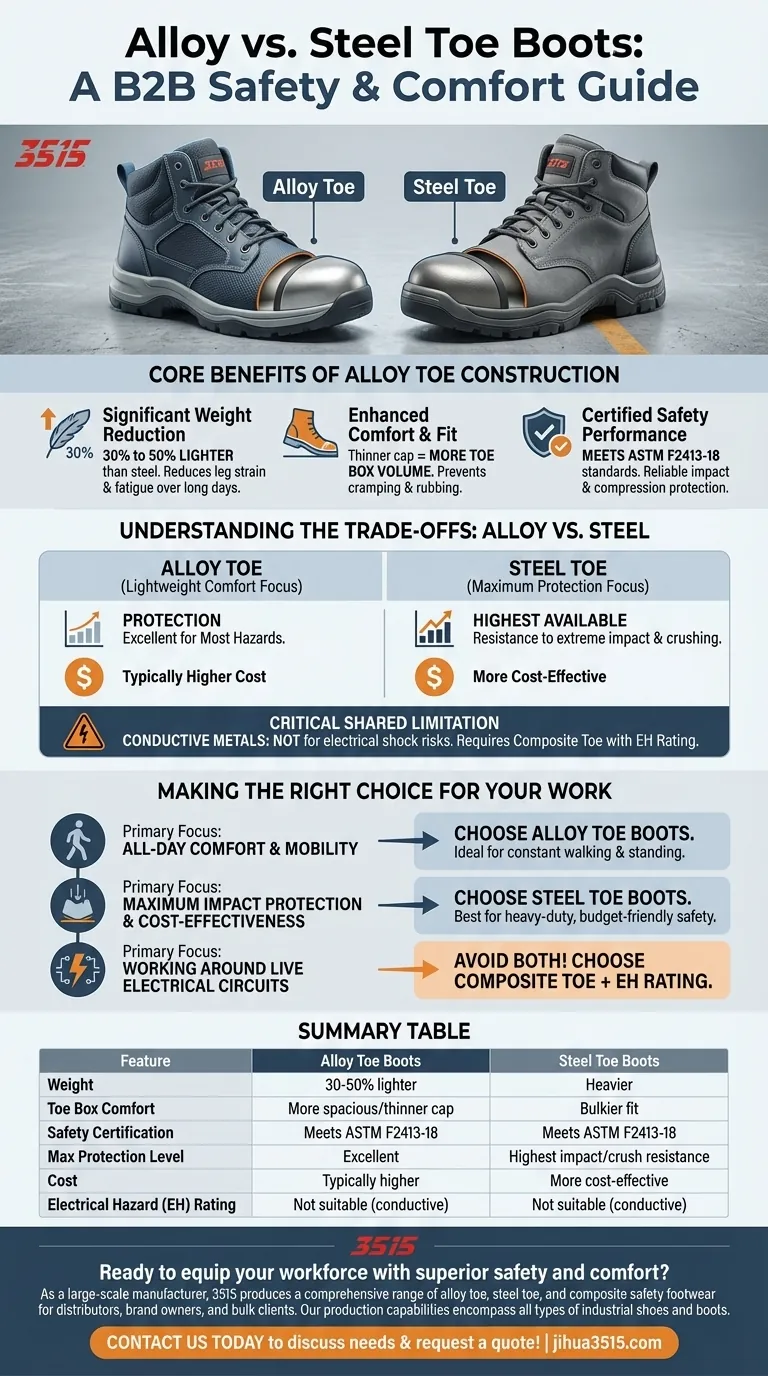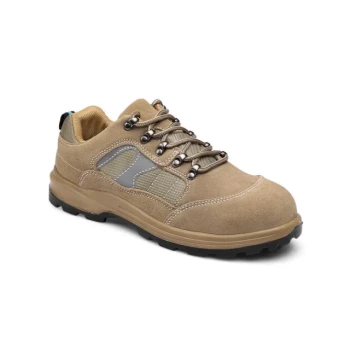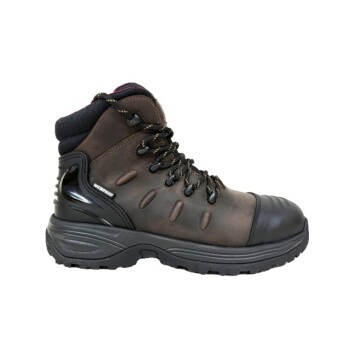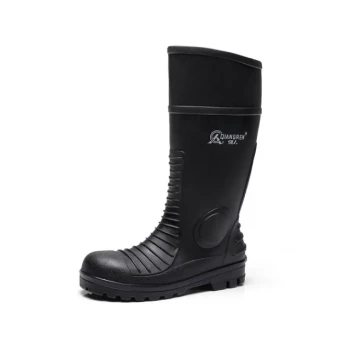At their core, the primary advantages of alloy toe boots are their significantly lighter weight and increased comfort compared to traditional steel toes. Made from lightweight materials like aluminum and titanium, alloy toe caps are 30 to 50 percent lighter than their steel counterparts. This reduction in weight is achieved while using a thinner material, which creates a more spacious and comfortable toe box inside the boot.
While traditional steel offers the absolute maximum in impact protection, alloy toe boots provide a modern balance, delivering certified safety with a focus on reducing wearer fatigue and improving all-day comfort.

The Core Benefits of Alloy Toe Construction
Alloy toe boots were engineered to solve the most common complaints about classic steel toe footwear: weight and bulkiness. They achieve this through the specific properties of their materials.
Significant Weight Reduction
Alloy toe caps are made from metals like titanium and aluminum. These materials provide robust protection while being considerably less dense than steel.
This results in a boot that is 30% to 50% lighter, directly reducing the strain and fatigue on your legs and feet over a long workday.
Enhanced Comfort and Fit
The strength of the alloy allows for a thinner protective cap compared to steel.
While the difference is minimal, this thinner profile translates into more volume inside the toe box. This provides more room for your toes to splay naturally, preventing cramping and rubbing.
Certified Safety Performance
Despite being lighter, alloy toe boots are engineered to meet the same ASTM F2413-18 safety standards for impact and compression as steel toe boots.
They offer a reliable and certified level of protection suitable for most hazardous work environments, successfully balancing safety with lightweight design.
Understanding the Trade-offs: Alloy vs. Steel
Choosing the right safety toe is a matter of understanding your specific work environment and priorities. Alloy toe boots are an excellent option, but they exist on a spectrum of protection and cost.
Maximum Protection Level
While alloy offers excellent protection, steel toe boots provide the highest available resistance to extreme impact, crushing, and shearing forces.
For environments with a constant risk of extremely heavy falling objects, steel remains the benchmark for maximum protection.
Cost Considerations
The materials and manufacturing process for alloy toes are typically more complex than for steel.
Consequently, steel toe boots are often the more cost-effective option, making them an accessible choice for many workers and employers.
A Critical Shared Limitation
It is crucial to understand that both alloy and steel are conductive metals.
Therefore, neither alloy nor steel toe boots should be your primary protection in roles with a direct risk of electrical shock. For these jobs, a composite toe boot with an Electrical Hazard (EH) rating is required.
Making the Right Choice for Your Work
Selecting the proper safety boot is a critical decision that directly impacts your daily comfort and on-the-job safety. Your primary job function should guide your choice.
- If your primary focus is all-day comfort and mobility: Choose alloy toe boots. Their lighter weight and more spacious toe box are ideal for workers who are constantly on their feet or covering long distances.
- If your primary focus is maximum impact protection and cost-effectiveness: Choose steel toe boots. They provide the highest level of strength for heavy-duty environments and are generally the most budget-friendly option.
- If your primary focus is working around live electrical circuits: Avoid both alloy and steel. You must select a boot with a non-metallic composite toe and a specific Electrical Hazard (EH) rating.
Ultimately, understanding the trade-off between lightweight comfort and maximum strength empowers you to select the boot that best serves your safety and daily needs.
Summary Table:
| Feature | Alloy Toe Boots | Steel Toe Boots |
|---|---|---|
| Weight | 30-50% lighter | Heavier |
| Toe Box Comfort | More spacious due to thinner cap | Bulkier fit |
| Safety Certification | Meets ASTM F2413-18 standards | Meets ASTM F2413-18 standards |
| Max Protection Level | Excellent for most hazards | Highest impact/crush resistance |
| Cost | Typically higher | More cost-effective |
| Electrical Hazard (EH) Rating | Not suitable (conductive) | Not suitable (conductive) |
Ready to equip your workforce with superior safety and comfort?
As a large-scale manufacturer, 3515 produces a comprehensive range of alloy toe, steel toe, and composite safety footwear for distributors, brand owners, and bulk clients. Our production capabilities encompass all types of industrial shoes and boots, ensuring you get the perfect balance of protection, comfort, and durability.
Contact us today to discuss your specific needs and request a quote!
Visual Guide

Related Products
- Premium Wholesale Wheat Nubuck Safety Boot with Rapid Lacing System
- Premium High-Cut Waterproof Safety Boots Manufacturing & Wholesale Solutions
- Premium Grain Leather Safety Boots for Bulk Supply
- Wholesale Safety Boots Manufacturer for Custom & Private Label Orders
- Wholesale Durable Safety Boots Manufacturer Customizable Steel Toe Work Boots
People Also Ask
- How can you optimize the fit of steel toe boots for better comfort? A Complete Guide to Custom Fit
- How do steel toe boots compare to composite toe boots? Choose the Right Toe for Your Job
- What are the main characteristics of steel-toe boots? Essential Safety Features Explained
- What are the requirements for a protective toe cap? Meet ASTM F2413 Standards for Maximum Safety
- What types of safety toe boots are available? Find the Perfect Fit for Your Job's Hazards



















